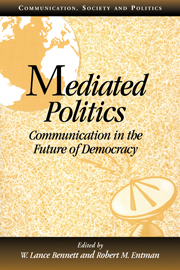Book contents
- Frontmatter
- Contents
- List of Figures
- List of Tables
- Contributors
- Preface
- Acknowledgments
- 1 Mediated Politics: An Introduction
- Part 1 Democracy and the Public Sphere
- Part 2 Citizens, Consumers, and Media in Transition
- Part 3 Mediated Political Information and Public Opinion
- Part 4 Mediated Campaigns
- 15 Issue Advocacy in a Changing Discourse Environment
- 16 Implications of Rival Visions of Electoral Campaigns
- 17 Mediated Electoral Democracy: Campaigns, Incentives, and Reform
- 18 “Americanization” Reconsidered: U.K.–U.S. Campaign Communication Comparisons Across Time
- Part 5 Citizens: Present and Future
- Index
16 - Implications of Rival Visions of Electoral Campaigns
Published online by Cambridge University Press: 05 June 2012
- Frontmatter
- Contents
- List of Figures
- List of Tables
- Contributors
- Preface
- Acknowledgments
- 1 Mediated Politics: An Introduction
- Part 1 Democracy and the Public Sphere
- Part 2 Citizens, Consumers, and Media in Transition
- Part 3 Mediated Political Information and Public Opinion
- Part 4 Mediated Campaigns
- 15 Issue Advocacy in a Changing Discourse Environment
- 16 Implications of Rival Visions of Electoral Campaigns
- 17 Mediated Electoral Democracy: Campaigns, Incentives, and Reform
- 18 “Americanization” Reconsidered: U.K.–U.S. Campaign Communication Comparisons Across Time
- Part 5 Citizens: Present and Future
- Index
Summary
Both our electoral process and our media coverage of elections are a disgrace. High-minded media critics call for more substance in campaign coverage – and then, given the symbiotic relation between campaigns and campaign coverage, campaigns too will have more substance. The media should fully report candidates' views on the issues, especially on issues that the public considers important. Arguably, media should place more emphasis on the areas of commonality between the candidates, and certainly spend less time and space on negative portrayals of political actors and on the “strategic frame,” which serve largely to breed cynicism (Cappella and Jamieson 1997; Fallows 1996; Rosen 1996).
My reading of these media commentators suggests that their analyses usually reflect two background assumptions about politics: (1) campaigns for political office are the central embodiment of democratic politics, and (2) the proper aim of politics is a common or public good about which the public is or should become broadly united. Given these assumptions, the health of democracy can be measured largely by the substance and intelligence of campaign discourse and its media coverage. Cynicism, negativity, and even conflict are presumptively dysfunctional and are likely to lead to reduced citizen participation. From this picture, media commentators' various prescriptions follow.
If, however, the conception of politics embodied in these two assumptions were rejected, prescriptions would need revision; current critiques of media performance might need refocusing. Given my quarrels with these assumptions, this chapter offers two media-related theses. First, despite the desirability and some possibility of improved campaign coverage, the actual and appropriate nature of elections places real limits on change in coverage.
- Type
- Chapter
- Information
- Mediated PoliticsCommunication in the Future of Democracy, pp. 342 - 361Publisher: Cambridge University PressPrint publication year: 2000

